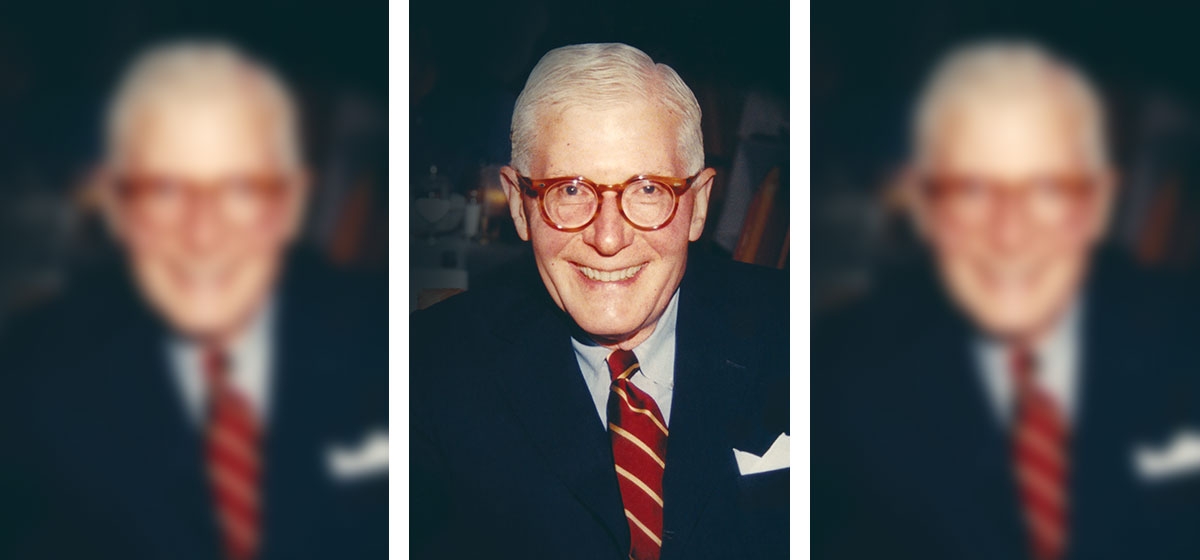William S. Dietrich II, Businessman and Philanthropist

Once, Pittsburgh was the world capital of the steel industry and it was, as recently as 30 years ago, the third largest headquarters city in America. Back in the 1970s, when the mills began to shut down, we all sighed. “Well, there goes manufacturing. The muscles are gone. But at least the brains are still here.”
Then we started to lose some of our major corporations—Westinghouse, Gulf Oil, Rockwell—one after another. Before too long, the brains began to follow the muscles right out of town. Today, we’re a smaller, less important city, but much more livable, as we like to say.
In 1940, Pittsburgh was the 10th largest city in the U.S., with a population of 676,000. Since then, we’ve lost half that population. Now, like a turtle, we’re shrinking in our shell. We don’t have the population or tax base to support some of the amenities we have come to know and love: libraries, museums, arts organizations and such. Fortunately, we are one of the wealthiest cities in the nation in terms of foundations, and a lot of “old money” continues to support many of our institutions today. That’s why our cultural base is so big for a city so small. If you consider the major corporations that once ruled this town, almost all of them were founded between 1880 and 1910. In those days, Pittsburgh was to our country what Silicon Valley has been in recent decades. George Westinghouse came from upstate New York and started not one, but two Fortune 500 companies: Westinghouse Air Brake and, of course, Westinghouse Electric. A.W. Mellon, one of the greatest financiers in American history, lived here and backed many of the companies that built this city and America. But throughout history, certain places have had their time. Athens had its day. So did Rome, and Pittsburgh, too. Even Silicon Valley will have its day. Inevitably, the country and history will move on as they have always.
I was born in the Crafton section of Pittsburgh in 1938, moved to Conneaut Lake when I was in fourth grade and graduated from high school there in 1956. About the time that I was ready for college, my family moved back to Pittsburgh, and I have been here ever since. I’ve done a lot of thinking about the city, the country and their fortunes, largely because I’m a student of history, and also because I hail from a local family. My father’s first job was with the Diamond Alkali Company here, where he worked until 1944. It was a commodity chemical producer and he wanted it to go into the detergent business to compete with Proctor & Gamble, but the company didn’t want to do it. So my dad became president of another company that did.
Unfortunately, Proctor & Gamble had about $80 to spend on advertising for every dollar he had and, eventually, the company got into trouble. So my father moved to Conneaut Lake and took an early retirement. There, while playing golf, he met a man by the name of Avery Adams, who was chairman of Jones & Laughlin Steel at the time. Through him, he got into the steel business. When I graduated from Princeton in 1960, I returned to Pittsburgh to work for my father, who was starting to sell steel here in the regional market. Before long, we branched out, selling a lot of steel in Detroit for the automotive industry, our largest customer. In time, we morphed our company from a steel producer into a product-focused business, making and selling non-load-bearing and curtain-steel studs. We produced steel at a very low cost and, since 80 percent of the cost of a steel stud is the steel itself, we were able to leverage our position in the industry to become a low-cost producer of a commodity product. We ended up with 21 plants throughout the U.S. I sold that company, Dietrich Industries, Inc., in 1996 to Worthington Industries of Columbus, Ohio. We were a $350 million company. They were a $1.5 billion company.
Throughout my life, I’ve never been a believer in inherited wealth. It denies young people the opportunity to do things their own way. I have one child, a daughter, and even before I had money she understood that almost everything I had in the end was going to go into a family foundation. I was the sole shareholder of Dietrich Industries and, before I sold it, I donated all my stock to a charitable annuity remainder trust. Upon my death, those funds will be folded into a foundation to be based in Pittsburgh. Something like 85 percent of that money will go to improving higher education in the region.
In 1997, I stepped back from Worthington Industries and launched a second career in the investing business, principally in private equity: buy-out funds, venture capital funds, and so forth. Effective April 2010, I hired Ed Grefenstette, whose father, Carl Grefenstette, was Henry Hillman’s right-hand man for many years. Ed is running The Dietrich Charitable Trusts these days and is my designated successor.
As for me, when I graduated from college, I felt a great hunger to achieve. I always thought that Princeton had an air of snobbery to it (but in hindsight, I don’t think that was true), so I said to myself, “Fine. If achievement is all about money, then I’ll show the bastards. I’ll get the money.” I’ve always been a workaholic. I love to work. But this focus on monetary gain is, unfortunately, what we are all about in this country these days. Life has become a game of acquiring more and more. But once you reach a certain point, then what? For so many people, no amount of money will ever be enough, and that creates a lot of problems, for those individuals and for the country.
When the founders drafted the U.S. Constitution in the late 18th century, democracy on a large scale was a new and untried form of government. The only previous experiments had been in ancient Greece where a flame burned brightly for a few brief years, and then degenerated into tyranny. How to preserve democracy? The genius of the founders was to rely, not on a piece of parchment, but upon the self-motivated political forces of the electorate. They first divided powers between the formerly independent states and a newly created federal government. Then, within the federal government, they further divided power between the legislative branch and an executive branch. They then encased the entire structure under the rule of law, ultimately arbitrated by a supreme court. And lastly, they weakened the legislative branch—thought to be the most aggrandizing power—between the House of Representatives and the Senate.
The results of this new form of government exceeded anybody’s wildest expectations; it made our government, and its leading economy, the envy of the world. But in the 20 years after the end of the Second World War, cracks began to appear in the edifice of U.S. power. The Japanese emerged from the rubble of the war within 35 years to mount a serious challenge to American power. With 10 percent of our population and scant resources, how did they do it? The Japanese invented and developed industrial policy: The state induced willful shifting of the industrial structure toward high technology, high value-added industries.
The Japanese economy eventually stagnated. It never had the resources to go toe-to-toe with the U.S., but industrial policy was later adopted with success by Taiwan, South Korea and Singapore. Its latest practitioner is China, under the banner of socialism with Chinese (capitalist) characteristics. With four times the population of the U.S. and the world’s largest internal market, China is destined to be the world’s leading economic power. Its rise is inevitable and unstoppable.
The only way to compete with industrial policy is to counter with an effective industrial policy of one’s own. This is highly unlikely, if not impossible, in the U.S., within the framework of our 18th-century political institutions. Two essential prerequisites for industrial policy are a strong central state and a top professional bureaucracy, as opposed to political appointees. The federal governments of Japan, France, Germany and the United Kingdom have an average of 30 political appointees. The U.S. has 1,500.
There is an anti-statist tradition in this country running back to Thomas Jefferson. “Government” and “bureaucracy” are terms of derision in the U.S. In order to have an industrial policy, we must have a parliamentary form of government, and that is a virtual impossibility. We are destined to slide down the slippery slope of industrial and, eventually, political decline. Political parties are now more polarized than ever before. I happen to think that this country is now where Great Britain was in the first two decades of the 20th century. We’ve topped out and, given our mindset, have nowhere to go. The American Century is truly finished. The Chinese Century has begun. And I wish every American had a chance to visit China. It’s unbelievable. It is the future. But this doesn’t mean that the U.S. is going to collapse. What’s wrong with living in Great Britain today? There’s nothing wrong with it. It’s an advanced industrial society, like ours. Let’s just hope we mimic the stability of the British. They have done a good job of managing their decline.
I’m a Republican, so it might seem strange to hear me ask this: Why is it that, in this country, we do not believe that a strong state should have a role to play in what’s going on with business? When Big Steel got into trouble back in the 1970s, people tried to lay the blame on foreign competition, [saying] “It’s an unfair playing field. In Brazil and China, they have government subsidies.” But those countries knew what they were doing. You cannot run a modern economy without some state-developed industrial strategy. The free market is not going to solve everything. And one of the best examples of this is in the business of healthcare, which alone will be enough to bankrupt this country if we don’t do something about it. There’s only one solution that makes any sense, and that is—get over it—a single-payer, Canadian-style system. But talk to a Republican about that and they’ll say, “What about the free market?” I would ask them, “Do you plan to go out and hunt for the cheapest brain surgeon?” Even a highly intelligent person would have a difficult time shopping for health services, let alone the average man on the street. Think of the new system as something akin to a giant Medicare plan. Most people don’t know that Medicare, while often made a scapegoat in the halls of The U.S. Capitol, costs about 7 or 8 percent a year to run. The private insurance system costs about 25 percent a year—more than three times as much. But I’m not optimistic that a system change will happen anytime soon.
Another major problem we have in this country is K-12 public education. How can the U.S. have the best university system in the world, and one of the worst public education systems? Ours is the only public education system in the world that’s run by 13,000 local school boards, that’s why! This, of course, is crazy. Is it right that we spend three times as much educating children in Fox Chapel as we do in Munhall? In France, they used to say, “At any given time and in any given age, every schoolchild will turn the same page of the same book.” We would be a better community if Munhall kids were educated the same as those from Fox Chapel, and the only way to make this happen would be through a statewide or national system where funding is equal. To me, that would be a fundamentally American thing to do.
So now, in this nation of “free enterprise,” even after everything that has happened on Wall Street in recent years, many of us remain totally against the government stepping in to help business. Look at the case of General Motors. People at the time were saying, “Let them fail.” Did they realize the implications of doing so? I’m sure they didn’t. The average guy doesn’t know that, in the fall of 2008, this country—and indeed the world—was on the precipice of a financial panic. What would we have done back then if we all plugged our bank cards into ATM machines and had them kicked back with a note that read: “Unable to process your transaction?”






